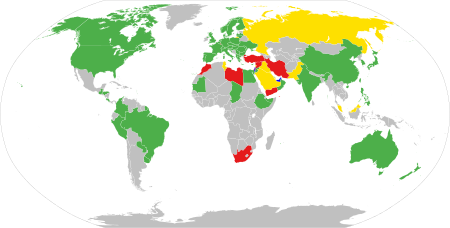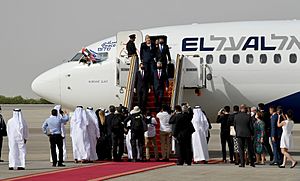Israel–United Arab Emirates normalization agreement facts for kids
| Abraham Accords Peace Agreement: Treaty of Peace, Diplomatic Relations and Full Normalization Between the United Arab Emirates and the State of Israel | |
|---|---|
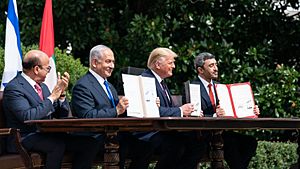 |
|
| Signed | September 15, 2020 |
| Location | The White House, Washington, D.C., US |
| Effective | Effective upon ratification by both parties |
| Mediators | |
| Signatories |
|
| Parties | |
| Ratifiers | Israeli cabinet, October 12, 2020 UAE Council of Ministers, October 19, 2020 |
| Language | English |
The Israel–United Arab Emirates normalization agreement is a peace deal. It is officially called the Abraham Accords Peace Agreement. This agreement was first announced by the United States, Israel, and the United Arab Emirates (UAE) on August 13, 2020.
With this agreement, the UAE became the third Arab country to officially make its relationship with Israel normal. Before this, Egypt did so in 1979 and Jordan in 1994. The UAE was also the first country in the Persian Gulf to normalize ties with Israel.
As part of the deal, Israel agreed to pause its plans to take over parts of the West Bank. The agreement made the long-standing but unofficial connections between the two countries official. The agreement was signed at the White House on September 15, 2020. Both countries later approved it.
Soon after the agreement, the UAE allowed direct phone calls to Israel. On August 31, 2020, the first direct commercial flight from Israel landed in the UAE. Also, the first cargo ship from the UAE arrived in Israel on October 12.
Contents
Why the Agreement Happened
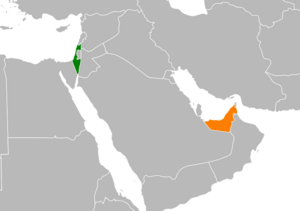
When the UAE became an independent country in 1971, its first president, Sheikh Zayed bin Sultan Al Nahyan, saw Israel as an "enemy." However, things slowly started to change over the years.
In 2015, Israel announced it would open a diplomatic office in the UAE. This was the first time Israel had an official presence in the Persian Gulf in over ten years.
Before the agreement, Israel and the UAE were secretly working together. They were fighting the COVID-19 pandemic. News reports said that Israel's spy agency, Mossad, got medical supplies from the Gulf states. Israel's Prime Minister, Benjamin Netanyahu, said in June 2020 that the two countries were working together against the coronavirus.
Both Israel and the UAE also shared concerns about Iran. They were worried about Iran's nuclear program and its influence in the region. This shared concern helped bring them closer.
The agreement also meant a big change for Prime Minister Netanyahu. He had wanted to expand Israeli settlements in the West Bank. But the agreement meant he had to pause these plans. Jared Kushner, a senior advisor to US President Donald Trump, helped make the deal happen.
What the Agreement Says
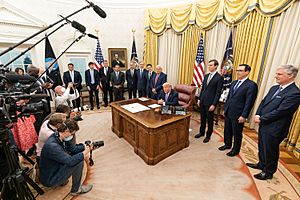
On August 13, 2020, the UAE's Minister of State for Foreign Affairs, Anwar Gargash, announced the agreement. He said the UAE wanted to address threats to a "two-state solution." This solution aims for both an Israeli and a Palestinian state living side-by-side.
According to President Trump and Prime Minister Netanyahu, Israel and the UAE would fully normalize their relations. They would open embassies and exchange ambassadors. They would also start working together in many areas. These areas include tourism, education, healthcare, trade, and security.
A joint statement from Trump, Netanyahu, and UAE's Crown Prince Mohammed bin Zayed Al Nahyan called it a "historic diplomatic breakthrough." They said it would help bring peace to the Middle East. The UAE also said it would keep supporting the Palestinian people.
Even with the agreement, Netanyahu said that Israel's claim to the Jordan Valley was still on the table. It was only paused for a while.
The Treaty Signing
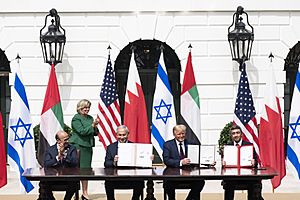
The official treaty was signed on September 15, 2020. The treaty recognizes that both Israel and the UAE are independent states. It requires them to exchange ambassadors. They also agreed to make other deals on things like visas. The agreement became official after both countries approved it.
Reactions to the Agreement
The agreement caused many different reactions around the world.
In Israel
Prime Minister Netanyahu said his plans to annex parts of the West Bank were only on hold. Many Israelis and government partners had already put these plans on hold. Other Israeli leaders, like Benny Gantz and Gabi Ashkenazi, thanked Trump and the UAE for the peace deal. They hoped it would lead to more peace agreements.
Some Israeli politicians, like Naftali Bennett, welcomed the deal but were sad about pausing the annexation plans. Others, like Miri Regev, opposed the deal because of this pause. The mayor of Tel Aviv, Ron Huldai, praised the deal. He even lit up the Tel Aviv City Hall with the flag of the UAE.
Some Israeli settler leaders felt betrayed by Netanyahu. They had supported his annexation plans. However, others in the settlements supported the deal. They saw it as a fair price for peace.
In the United States
US Ambassador to the United Nations, Kelly Craft, called the agreement "a huge win." She said it showed how much people in the Middle East want peace. Joe Biden, who was running for president, also praised the agreement. He said it built on past efforts to bring Arab countries and Israel closer.
Jared Kushner said the deal would make the Middle East more peaceful. He believed it would mean fewer American troops would be needed there. Secretary of State Mike Pompeo also said the deal was important for stability.
In the Muslim World
Many countries in the Persian Gulf region had mixed reactions. Bahrain was the first Gulf Arab country to publicly support the deal. However, its king later said Bahrain was committed to a Palestinian state. Bahrain later signed its own normalization agreement with Israel.
Kuwait did not officially comment, but many of its lawmakers and citizens opposed the deal. Oman publicly supported the agreement. Saudi Arabia's Foreign Minister said the deal could be positive. But he added that Saudi Arabia would not normalize relations until peace was made with the Palestinians.
Palestine
Palestinian leaders strongly rejected the agreement. They called it a "betrayal" and a "stab in the back." The Palestinian National Authority recalled its ambassador from the UAE. Many ordinary Palestinians also protested the deal on social media.
However, Yasser Arafat's widow, Suha Arafat, apologized to the UAE for the Palestinian reactions. She said the UAE had supported Palestinians in the past.
Iran
Iran strongly condemned the deal. Its Foreign Ministry called it a "dangerous" and "shameful" act. Iran warned the UAE that it would face serious consequences. Iranian President Hassan Rouhani called it a "huge mistake." He warned the UAE against letting Israel have a presence in the Gulf.
Protesters in Tehran burned the flag of Israel. Iran's Supreme Leader, Ali Khamenei, accused the UAE of betraying the Islamic world. He said the normalization would only be temporary.
Turkey
Turkey's Foreign Ministry also condemned the agreement. It called the UAE's actions "hypocritical." Turkish President Recep Tayyip Erdoğan even said Turkey might stop diplomatic relations with the UAE.
Pakistan
Many people in Pakistan protested the agreement. Pakistan's Prime Minister Imran Khan said his country would never recognize Israel. He stated this would remain true until a Palestinian state was created.
Other Muslim Countries
Egypt's President Abdel Fattah el-Sisi welcomed the deal. Jordan's Foreign Minister said the agreement should lead to Israel leaving Palestinian territories. Otherwise, he said, it would make the conflict worse.
Libya's Government of National Accord called the deal an "unsurprising betrayal." Sudan's Prime Minister said his government could not establish ties with Israel. This decision, he said, could only be made by a democratic government.
In Europe
United Kingdom
British Prime Minister Boris Johnson praised the agreement. He called it a path to peace in the Middle East. He also welcomed the pause in Israel's annexation plans.
European Union
Many European Union countries welcomed the deal. They hoped it would bring peace and stability to the Middle East. They also saw Israel's pause on annexation as a positive step. Countries like Italy, Spain, Germany, and France all expressed similar hopes for a two-state solution.
Russia
Russia said it supported a two-state solution for the Israeli–Palestinian conflict. It noted that the agreement paused Israel's annexation plans. Russian President Vladimir Putin hoped the deal would increase stability in the Middle East.
Luxembourg
Luxembourg's Foreign Minister Jean Asselborn was more cautious. He doubted the agreement would bring stability without a two-state solution. He said the UAE had let the Palestinians down.
Other Countries
India welcomed the agreement. It said both nations were its allies. China was also pleased and hoped it would restart talks between Israelis and Palestinians. South Korea and Japan also welcomed the deal.
Canada and Australia both called the deal a positive and historic step. They were glad about the pause in annexation plans.
United Nations
The UN Secretary-General António Guterres welcomed the agreement. He praised the pause in Israel's annexation plans. He said peace in the Middle East was more important than ever.
What Happened Next
After the agreement, Israel and the UAE started direct telephone services. An Emirati company and an Israeli company signed a deal to research COVID-19. This was the first business deal between companies from the two nations.
On August 18, Israel's spy chief, Yossi Cohen, visited the UAE. They discussed security cooperation. On August 29, the UAE officially ended its boycott of Israel.
On August 31, 2020, the first commercial flight from Israel to the UAE took place. It was an El Al flight, El Al 971. Saudi Arabia allowed the plane to fly through its airspace. The plane had the word "peace" written on it in Hebrew, Arabic, and English. It received a special welcome in Abu Dhabi. Both Saudi Arabia and Bahrain later permanently opened their airspace for flights between Israel and the UAE.
Soon after, Israeli airlines announced direct flights to the UAE. The first cargo ship from the UAE arrived in Israel on October 12.
In the UAE, hotels started serving kosher food. This is food prepared according to Jewish dietary laws. The first kosher-certified restaurant opened in Dubai.
On September 9, the Arab League did not condemn the UAE's decision. This was because some countries objected to a Palestinian proposal to do so.
The agreement also opened the door for more economic cooperation. This included formal investments. An Abu Dhabi investment office opened its first branch in Israel. A Dubai-based group also announced plans to buy an Israeli airline.
See also
 In Spanish: Acuerdo de normalización de las relaciones entre Emiratos Árabes Unidos e Israel para niños
In Spanish: Acuerdo de normalización de las relaciones entre Emiratos Árabes Unidos e Israel para niños
- Bahrain–Israel normalization agreement
- Egypt–Israel peace treaty
- Israel–Jordan peace treaty
- Israel–Morocco normalization agreement
- Israel–Sudan normalization agreement
 | Delilah Pierce |
 | Gordon Parks |
 | Augusta Savage |
 | Charles Ethan Porter |


